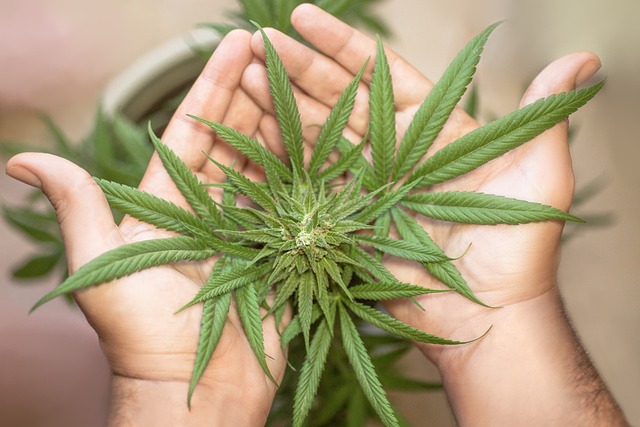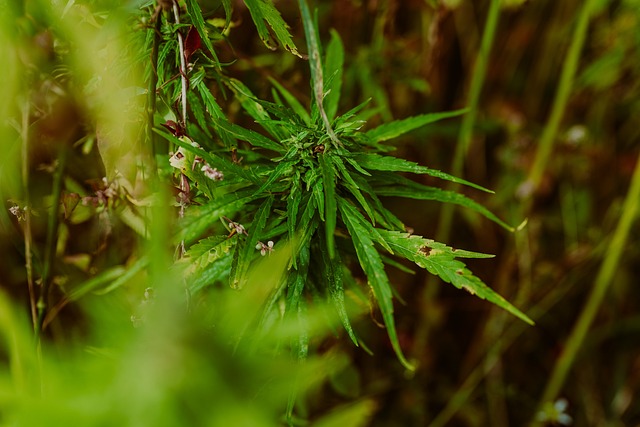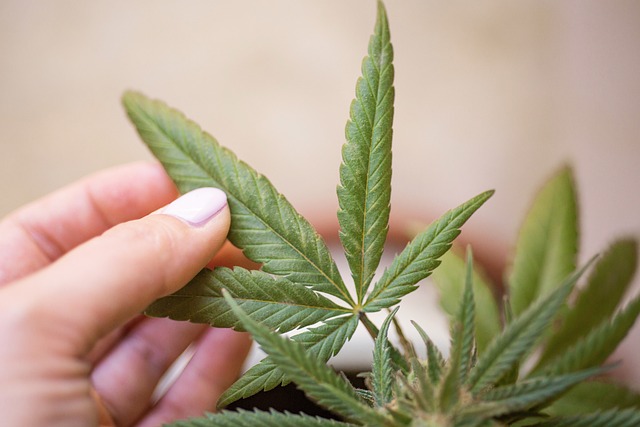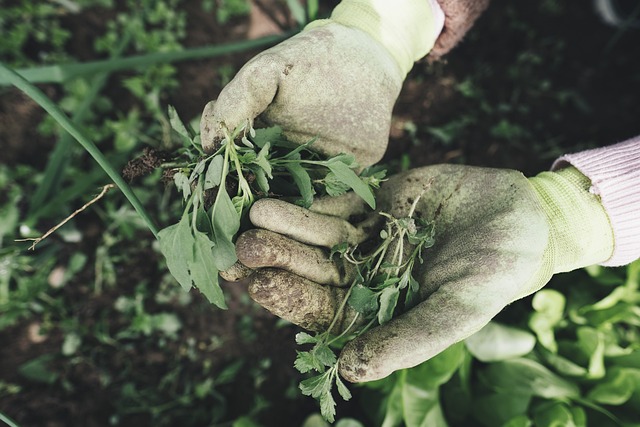THCA (tetrahydrocannabinolic acid), a non-psychoactive cannabinoid found in cannabis plants, is legally complex in Tennessee. While the 2018 Farm Bill federally legalized hemp and its derivatives like THCA, provided they contain less than 0.3% THC on a dry weight basis, Tennessee's state laws classify THCA as a Schedule I substance, making it illegal for medical or recreational use within the state. However, Tennessee does allow the sale and use of CBD products derived from hemp. For THCA to be legal in Tennessee, it must meet strict federal and state regulations, including maintaining the 0.3% THC threshold and adhering to local ordinances. The state's hemp industry, including the cultivation of THCA-rich flowers, is regulated by the Tennessee Department of Agriculture. Consumers interested in THCA products must stay informed on legislative changes as the legal status of THCA in Tennessee is subject to change and requires careful navigation of both federal and state laws. As of early 2023, THCA remains a controlled substance for medical or recreational use but can be found in certain hemp-derived products within the bounds of the law.
Explore the intricacies of THCA flower, a non-psychoactive cannabinoid with therapeutic potential that’s gaining attention in Tennessee. This article dissects its legal standing, chemical properties, and cultivation practices within the Volunteer State. Delve into how THCA differs from its psychoactive counterpart THC, and understand the regulatory environment that governs its use. Learn about the diverse methods for processing and consuming THCA flower to harness its wellness benefits, all while adhering to Tennessee’s evolving legal landscape.
- Understanding THCA Flower and Its Legal Status in Tennessee
- The Chemical Makeup and Effects of Raw THCA
- Cultivation and Harvesting THCA Flowers Legally in Tennessee
- Processing and Consumption Methods for THCA Flower
- Regulatory Framework Governing THCA in the Volunteer State
Understanding THCA Flower and Its Legal Status in Tennessee

THCA, or tetrahydrocannabinolic acid, is the raw form of THC, the psychoactive component found in cannabis that is well-known for its effects once it undergoes heat, typically when smoked or vaporized. THCA flower refers to the buds of the cannabis plant that contain THCA in abundance and have not been heated beyond a certain point to convert it into THC. These flowers hold therapeutic potential due to the presence of various cannabinoids, including THCA, which some users prefer for its own unique properties.
The legal status of THCA flower is an area of nuance within Tennessee’s broader cannabis laws. As of the knowledge cutoff date, Tennessee law allows for the use of cannabis products that contain no more than 0.3% THC on a dry weight basis under the Farm Bill passed by Congress in 2018 and its state-level counterpart. This legislation legalized hemp and derivatives with THC concentrations falling within the specified limits, effectively opening a pathway for the sale and use of CBD products and, by extension, products that contain THCA flower so long as they adhere to the legal THC limit. However, it’s important to note that Tennessee’s laws can be complex, with local regulations potentially imposing additional restrictions. Users should ensure they are in compliance with both state and local laws when purchasing or using THCA flower products.
The Chemical Makeup and Effects of Raw THCA

Delta-9-tetrahydrocannabinolic acid, commonly known as THCA, is a naturally occurring compound found in cannabis plants. Unlike its well-known isomer delta-9-THC, THCA does not produce psychoactive effects, making it a subject of interest for those seeking potential health benefits without the ‘high’ associated with its decarboxylated form. The chemical makeup of THCA includes a structure with an additional carboxyl group (a carboxylic acid functional group) at the ninth position on the decarboxylation pathway to delta-9-THC. This distinguishing feature means that THCA exists in raw or uncured cannabis flowers and is one of the most abundant cannabinoids in the plant.
Research on THCA has suggested potential therapeutic properties, including anti-inflammatory, anti-nausea, anti-emetic, and neuroprotective effects. These attributes are attributed to its interaction with the body’s endocannabinoid system, particularly the CB1 and CB2 receptors. As of my knowledge cutoff in 2023, THCA’s legal status varies by state within the United States, including Tennessee. In Tennessee, possession of cannabis containing THCA is legal for medical purposes under certain conditions, as defined by the Tennessee Medical Cannabis Act. Users interested in exploring the potential benefits of THCA should first consult with healthcare professionals and ensure compliance with local laws. It’s important to stay informed about the evolving regulations surrounding cannabinoids like THCA, as their legal status can change over time.
Cultivation and Harvesting THCA Flowers Legally in Tennessee

In recent years, Tennessee has seen a shift in its policies regarding cannabis derivatives, including THCA-rich flowers. The cultivation and harvesting of THCA flowers are legally permissible under certain conditions within the state, as long as they adhere to the Tennessee Department of Agriculture’s Industrial Hemp Program regulations. In 2018, the Farm Bill federally legalized hemp, which includes THCA, opening the door for states like Tennessee to establish their own frameworks for its production. Growers interested in cultivating THCA flowers must first obtain a license from the state, ensuring they follow stringent guidelines that include location restrictions, testing protocols, and strict adherence to cultivation practices to maintain the integrity of hemp products. The harvesting process also requires meticulous care to preserve the THCA content, as improper handling can convert THCA into THC, which is psychoactive and potentially subject to different legal considerations. Tennessee’s climate and soil conditions offer a favorable environment for growing high-quality THCA flowers, provided that cultivators stay compliant with both state and federal regulations. This has led to a burgeoning market for CBD and other cannabinoid products derived from these legally cultivated flowers, positioning Tennessee as a potential player in the hemp industry. Navigating the legal landscape requires ongoing due diligence and adherence to all regulatory requirements set forth by state and federal entities.
Processing and Consumption Methods for THCA Flower

THCA, or tetrahydrocannabinolic acid, is a non-psychoactive cannabinoid found in the flower of the cannabis plant and is considered the precursor to THC, its psychoactive counterpart. As interest in cannabinoids grows, so does the attention on how to process and consume THCA-rich flowers, especially given their legal status in states like Tennessee. Processing THCA flowers involves careful cultivation practices that preserve the acid form of THC before it is activated through decarboxylation. Once harvested, these flowers can be processed into various consumption forms such as edibles, concentrates, or smokable buds, each offering a unique experience due to the entourage effect provided by the plant’s full spectrum of cannabinoids and terpenes.
For those in Tennessee where THCA flowers are legal, consumption methods vary widely based on personal preference and desired effects. Smoking THCA flowers provides immediate effects as the cannabinoids are absorbed directly into the bloodstream through the lungs. Alternatively, THCA flowers can be infused into food or beverages, offering a prolonged effect as it is metabolized through the digestive system. Vaporization offers a middle ground, providing faster onset than edibles but not as immediate as smoking, and allows for temperature control to avoid converting all of the THCA into THC if that’s desired. Regardless of the chosen method, understanding the specific legalities and processing requirements ensures compliance with local regulations, ensuring both safety and legality when enjoying THCA flowers.
Regulatory Framework Governing THCA in the Volunteer State

Tennessee’s regulatory framework for tetrahydrocannabinolic acid (THCA) is distinct within the broader context of cannabis derivatives, reflecting a nuanced approach to this compound. As of the knowledge cutoff date in early 2023, THCA is legally distinguishable from other cannabinoids such as delta-9-tetrahydrocannabinol (THC) under Tennessee law. The Volunteer State classifies THCA as a Schedule I substance under its Controlled Substances Act, aligning with the federal government’s stance on cannabis and its derivatives per the Farm Bill of 2018. This classification implies that THCA, in itself, is not legal for medical or recreational use within Tennessee boundaries. However, Tennessee has made exceptions for certain forms of cannabidiol (CBD) and THC that contain less than 0.3% THC by dry weight, provided they are derived from industrial hemp compliant with the 2018 Farm Bill. The state’s Department of Agriculture oversees hemp cultivation and processing within Tennessee, ensuring compliance with both state and federal regulations. Consumers interested in products containing THCA must be cautious and mindful of these regulations, as possession and sale of THCA outside the established legal parameters can lead to legal consequences. It is imperative for individuals and businesses operating within or around THCA to stay informed about the evolving regulatory landscape, as legislative changes could potentially redefine the legality of THCA in Tennessee.
In conclusion, THCA flower represents a nuanced chapter within the evolving narrative of cannabis legality and science. Tennessee’s regulatory landscape is continually adapting to accommodate the cultivation and processing of THCA flower, as outlined in our exploration of its legal status, chemical properties, and consumption methods. As THCA legal in Tennessee becomes more defined, enthusiasts and producers alike can look forward to a future where this natural compound is harnessed responsibly and effectively within the state’s borders. The intricate details of its cultivation, effects when consumed, and the strict regulations governing its use underscore the potential of THCA flower as a significant player in Tennessee’s agricultural and health sectors. With a clear understanding of these elements, stakeholders can navigate this emerging market with confidence and foresight.
